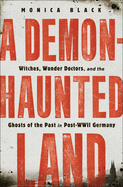
The history of postwar West Germany is often simplified into one of triumphant renewal, with the former Nazi state reborn as a democracy that faced its past head-on. The reality is much more complicated, as history professor Monica Black explains in her revelatory A Demon-Haunted Land: Witches, Wonder Doctors, and the Ghosts of the Past in Post-WWII Germany. Black's history of postwar Germany focuses on the outbreaks of superstition and messianic religious belief that consumed the war-torn nation, including charismatic faith healers that drew crowds of thousands, predictions of the end of the world that dominated newspapers and even a rash of witchcraft accusations. Black argues that these outbursts were fueled by the sublimated guilt, shame and suffering of a society where many had committed or tolerated terrible crimes.
In contrast to the modern view of Germany as a nation that has reckoned with its history, postwar West Germans were eager to put it behind them and rebuild their nation. This necessitated a remarkable silence about the past on the part of many citizens, who would refer to the Nazi era only euphemistically. In the absence of a public reckoning, Black argues, many expressed themselves through superstition and fervent religion. Accusations of witchcraft exposed the rifts in communities where neighbor had turned against neighbor under the Nazis, for example, and the many faith healers that emerged seemed to heal spiritual injuries as often as physical ailments. Black's portrayal of postwar Germany as a morally and spiritually damaged nation is a fascinating and necessary corrective to popular redemption narratives. --Hank Stephenson, the Sun magazine, manuscript reader

